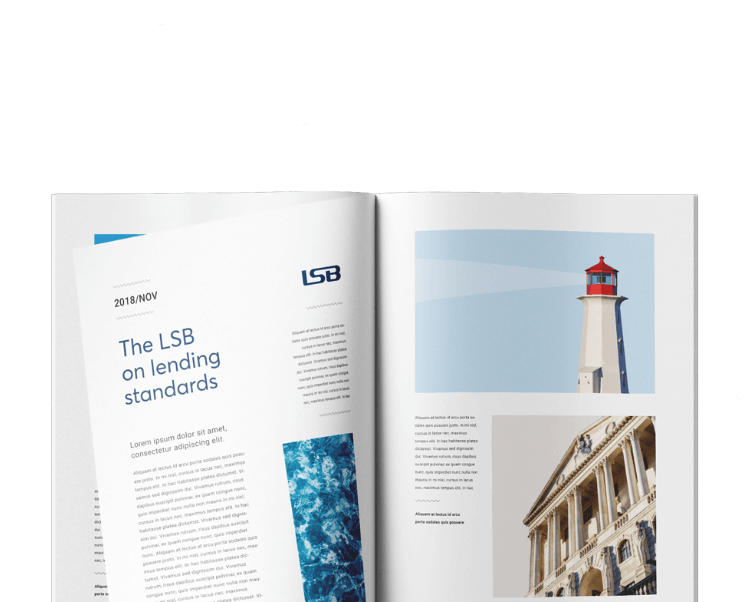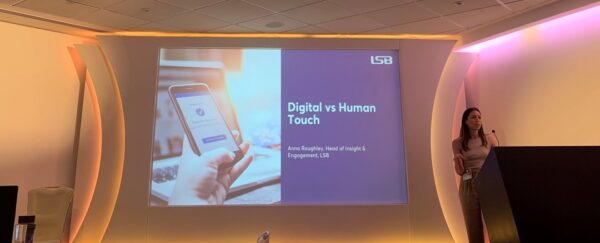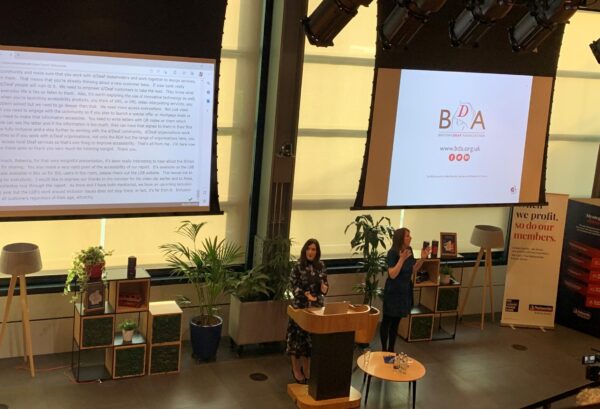LSB Head of Insight and Engagement, Anna Roughley, recently spoke at the Universal Inclusion event – ‘An inclusive world: disability enterprise and innovation’, on the importance of driving financial inclusion for all. You can read Anna’s speech from the event below.

*The notes below may differ from those delivered on the day*
Hello, my name is Anna Roughley, and I am the Head of Insight and Engagement at the Lending Standards Board – the LSB. I have to say, I’m really honoured to have been invited to talk to you today about our work to drive inclusion within financial services. It’s something I, and the LSB, are extremely passionate about.
The LSB is the primary self-regulatory body for the banking and lending industry. For those who don’t know, our mission, and at the heart of everything we do, is to drive fair outcomes for personal and business customers of financial services, through setting and overseeing best practice Standards and Codes. Banks, lenders and building societies, ‘firms’ as we’ll call them for ease, sign up to these Standards and Codes voluntarily, because they want to do more for their customers than the minimum statutory requirement. Once signed up, it is mandatory that they comply.
Alongside our oversight work, we offer insight to registered and non-registered firms, through thought pieces, reports, events and training. The insights we offer are broad – ranging from upcoming risks in the industry and how to mitigate them, how to further embed our Standards and Codes at all areas of the business to ensure adherence, and how customers may be impacted by external or personal circumstances and how firms can adapt their processes in order to ensure consistent good outcomes for their customers. It’s that last point in particular that I’m here to talk to you about today – how we are working with firms to ensure financial inclusion for all. By financial inclusion, I mean creating products and services within the industry that everyone, no matter their life circumstances, can access in the way that they need.
Inclusion and the Standards
We know achieving financial inclusion is not easy, especially in today’s rapidly changing environment and with such difficult times ahead.
I don’t mean to bring the mood down here, but as we are acutely aware, as I’m sure you all are, the pandemic, Brexit, the war on Ukraine, and the cost-of-living crisis are causing mass uncertainty, instability and challenges across the country for individuals and businesses. As the landscape evolves, so do customer’s needs. Regardless of that and actually, because of that very reason, there has never been a more important time for firms to ensure their offerings are as inclusive and accessible as possible. Everyone, and I mean everyone, should have equal access to financial services and products that meet their needs, both in their personal lives and in business.
The LSB has and will continue to drive forwards inclusion in all that we do. Our registered firms will be no stranger to this, as our Standards make clear the importance of ensuring inclusion at all stages of the customer journey, from product design through to delivery and ongoing customer support. To ensure they continue to reflect good practice in today’s environment, we recently updated the personal Standards to ensure that firms who have signed up have inclusive design and services embedded within their customer journey. The same will be done for the business Standards later this year.
Keeping the Standards up to date in this space and ensuring firms are implementing them, is one way we are driving financial inclusion, but we know that isn’t enough. As an organisation we want to do more. We want to use our unique position within the industry, as an independent body working with stakeholders and firms, to research areas of customer detriment, where firms (on top of the hard work they are already putting in) can be more inclusive, and that’s where the report that I’m here to talk to you about today comes in.
Inclusion in Business Banking & Credit: disability and other access needs
Early last year, we were lucky enough to start exploring a new project with the support of Jacqueline here and Universal Inclusion. This project focussed on the experience disabled customers and people with other access needs have when it comes to using business banking services. We interviewed inspiring experts by experience, community representatives and organisations, and brought these insights together with our own understandings gathered from registered firms and stakeholders, and our report on Inclusion in Business Banking & Credit was born. We are so grateful to everyone who contributed to the report. Participants ranged from charities to fashion designers, therapists to policy experts. It really was a fascinating project, and I for one learnt so much from the people we spoke to. From them we learnt there was a widespread perception that in many sectors, both public and private and including financial services, more could be done to understand disability and adapt to those who require support.
The aim of the report we produced is to remove barriers for people with access needs when it comes to accessing the financial products and services they require for setting up and running a business. In the piece, we considered how business banks and lenders can be as inclusive as possible, assist and empower customers and give them equal opportunities to achieve their business goals. We took a look at a range of areas from raising awareness to the importance of inclusive language, to signposting, mentoring and inclusive design. I wanted to share with you some of the key insights from the report today. Honestly, I could talk for hours on this topic, but don’t worry, today is just going to be a whistle stop tour of the report. I will be around after though if anyone wants to chat, and of course you can access the full report on our website.
Key insights: inclusive design
To achieve financial inclusion, we shared that firms need to consider inclusion from the very beginning of a product or service, before it has even taken shape. I’m talking here about inclusive design. To do this, we shared that firms must consider who is involved within their design and sign-off process, to check that there is a selection of diverse viewpoints being used to assess risks and opportunities. Without doing this, there is a much higher potential for products and services to be inaccessible or unsuitable for different people.
What firms don’t want is a product going live that isn’t fit for purpose, and then having to work backwards to rectify issues. As an example, one of the people we interviewed spoke about channels that could be inaccessible for customers, that are often used by banks and lenders, because of the increased push towards digital services. The move to digital provides loads of opportunities for customers, but for some, they just aren’t suitable. The participant mentioned how there seems to be an increased push for customers to interact through mobile phone banking apps and raised concerns that this could leave some disabled customers without access to banking or lending services, as disabled people have been found to have lower smartphone ownership than the non-disabled. Having an understanding of these risks during the design phase enables firms to sit back and think – ok, this will be great for many, but for those who can’t use this channel, we need to have an alternative in place. That way no one is left behind.
Key insights: raising awareness through lived experience
I’ve mentioned there that firms should be aware of accessibility risks before designing a product, and that having diverse viewpoints during the design phase can help to mitigate this. How? By raising awareness of what difficulties a customer may face.
What I’m not saying here is that we expect firms to understand everything a customer may face, but through good training and shared lived experience, staff can gain a good understanding and go on to be more inclusive, flexible, empathetic and understanding as a result. As an example, one interviewee raised that some neurodivergent customers, for example, those with ADHD, may need additional time to complete tasks that may be classed as basic. Understanding something like this could be beneficial to all staff, allowing everyone to have a clearer picture of how people live and operate with backgrounds or experiences that are unlike their own. Raising awareness in this way is also beneficial to staff who are disabled or have access needs, as colleagues and employers can be more flexible and understanding.
One thing that we heard repeatedly during our interviews for the report was how vital acknowledging, and welcoming, lived experience of disability and other access needs is. Lived experience is invaluable and difficult to replicate with training, so having disabled people and those with other access needs at all levels of the firm could have many benefits. Not all disabilities are visible of course, and we therefore shared that firms should have a progressive and encouraging culture to help create an environment where staff feel able to disclose, to first and foremost gain any support they may need, and to share their views and insight. Firms also need to consider how they are recruiting, whether their processes are accessible, language is accessible, whether they’re advertising on disability forums, charities etc. Without this, they may miss out on huge amounts of talent that can support the business to be more inclusive, whilst offering equal opportunities for disabled people to thrive in the industry.
Key insights: supporting information
I’d now like to talk about the importance of firms providing supporting information to business banking customers. What I mean by that is tailored information that sets out what the stages of the customer journey are for the customer. For example, having information for start-ups on which banking facilities they may need to get going as a business, compared to a more established SME, that may be switching providers. This would enable customers to educate themselves on the requisite steps and then be more prepared as a result.
Firms need to take into account how they provide this supporting information, and how requests for information are made too, ensuring they keep this under review so the processes remain accessible. As an example, one contributor to our report highlighted a form they needed to fill out in order to access banking services, and how the form enabled the user to access a completed version showing the type of information required. This meant they did not need to second guess what type of information was needed, and made the process more accessible as a result.
Getting things right first time saves time, and so anything that can improve the likelihood of that happening should be a consideration. Specialist teams could and should also be considered too by firms. These teams are dedicated to managing the support needs of customers and usually receive additional training, allowing them to increase their skills, act as a point of contact for other staff.
Upcoming work to drive financial inclusion
I did say this was going to be a whistle stop tour, and so whilst I’ve only touched upon three areas of the report here, we also provided insights and practical considerations on mentoring, signposting, measuring success, and having solid governance structures in place. All aimed at firms becoming more inclusive.
Let me assure you that we won’t stop here. Inclusion should be achieved for all customers, regardless of their age, ethnicity, gender, health difficulties, financial status – the list goes on.
We are now embarking on producing a report looking at how firms can be more inclusive for the d/Deaf communities. We are currently speaking with a number of individuals who are experts either by profession or experience, but usually both. As with the report I’ve spoken about today, we’ll be conducting interviews to understand their experience of banking and credit in relation to their accessibility requirements, and we want to understand how firms can improve in this area. This report is due to be launched in May, and and a further report exploring how firms can better support ethnic minority business owners to access lending and banking and grow their businesses, will be published later in the year. For anyone who wants to be kept up to date on its launch or any of our other work, you can sign up to our newsletter mailing list by emailing insight@lstdb.org.uk.
To live in a truly inclusive world, we can’t shy away from difficult conversations, from admitting when we haven’t got things right and how we can improve, from asking questions of others and learning from their experiences, and ultimately, from all championing inclusivity.









